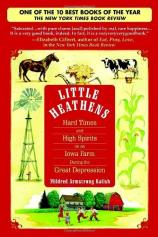Reading Group Guide
Discussion Questions
Little Heathens: Hard Times and High Spirits on an Iowa Farm During the Great Depression

1. Little Heathens recounts an adult woman’s memories of a childhood long past. What is the difference between a child's perspective and an adult’s? How did Kalish’s understanding of the world change as she grew older? Are there some ways in which her approach to life is still the same now as when she was a child?
2. How did Kalish’s memoir enhance your understanding of the Great Depression? What differences existed between farmers and city dwellers who lived through it? What legacies of this time period exist in your family?
3. Which of Kalish’s relatives was most memorable to you? Was there an Aunt Belle in your childhood? Who plays that role for the next generation?
4. How would you characterize the dynamics within Kalish’s large family? How was peace kept? What accounted for the contrasts between her relatives who were indulgent and those who were frugal?
5. What comparisons can you make between men’s and women’s roles during this period in American history? What did Kalish’s mother teach her about what a woman could expect of life?
6. Discuss the economic realities that defined this era. What determined who would manage to get by and who, like the families she describes, would lose their farms altogether? What attitudes toward money was Kalish taught to develop?
7. Kalish describes the longevity of many of her ancestors, who relied on home remedies rather than emergency rooms for treatment. She also describes the presence of cream in most of her family’s meals, and the availability of glorious fresh-baked desserts that would be strictly forbidden on a contemporary weight-loss plan. What keys to health and wellness does her memoir provide?
8. What did it take to fit in within this Iowa community? Which children and adults were accepted, and which ones might be subject to pranks or gossip? How did Kalish’s experience at school compare to that of a student at one of the large public schools that now replace her classroom?
9. How did you react to the discussions of food preparation featured in the book–from regulating the stove temperature to slaughtering–and cleaning–the main course? What were the benefits and shortcomings of such a labor-intensive use of fresh ingredients, and of life without supermarkets? Did any aspects of Kalish’s Depression-era cuisine surprise you?
10. In the end, Kalish tells us how she was able to journey far from the farm and build a life in urban areas. What distinguishes those who remained on the farm from those who left it?
11. Had you realized that the rural electrification bill was not passed until Roosevelt’s presidency? How did it shape a community to live at the mercy of the seasons, without electricity or indoor plumbing? What was Kalish’s relationship with the natural world like?
12. Discuss the role of religion in this community. What did the hierarchy of religions described by Kalish indicate about the populations who lived in her area? What were the foundations of faith within her family?
13. Early on, Kalish tells us that her mother was a single parent, and that the story of her absent father was rarely mentioned. How did her family compensate for her absent parent? How did her mother’s experience of single motherhood compare to that of parents in similar situations today?
14. Could your family endure the way of life described in the book?
15. What is gained and lost in a world that favors technology over manual labor?
16. Discuss the title of Kalish’s memoir. Which of her extended family’s antics made you laugh the most? How have the standards for naughty “little heathens” changed since she was a child?
17. What stories would you include in your memoir? What aspects of history does your life capture?
Little Heathens: Hard Times and High Spirits on an Iowa Farm During the Great Depression
- Publication Date: April 29, 2008
- Paperback: 292 pages
- Publisher: Bantam
- ISBN-10: 0553384244
- ISBN-13: 9780553384246







